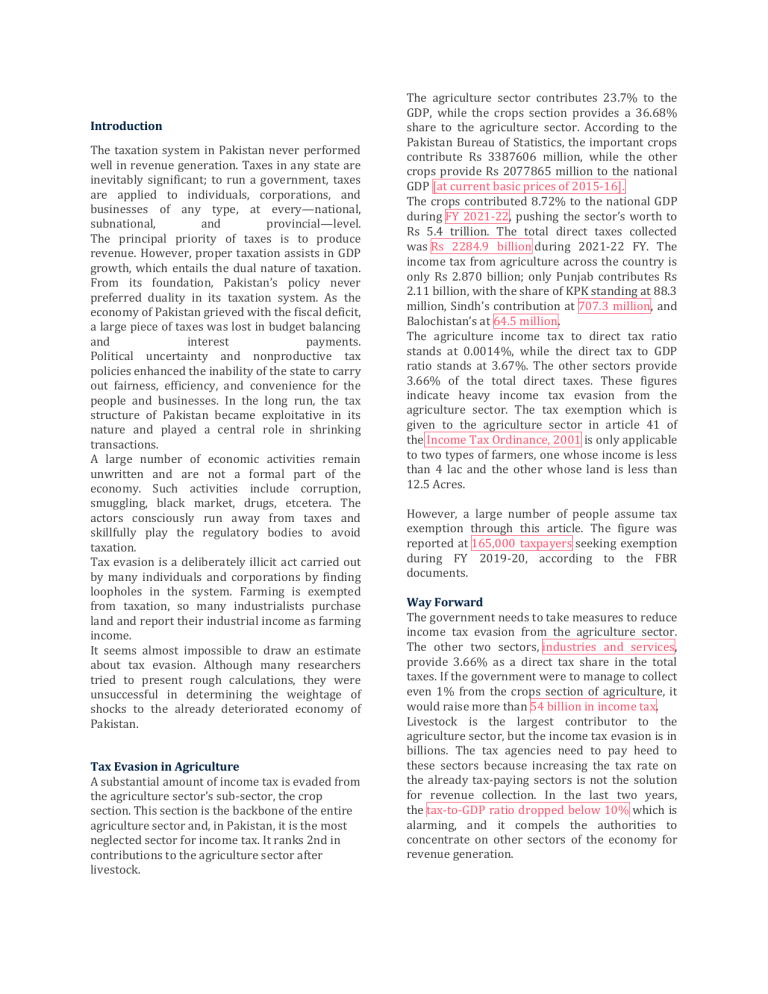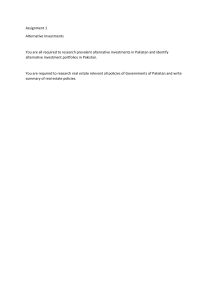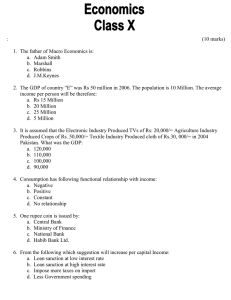Tax Evasion The Pioson for Agriculture in Pakistan, Article
advertisement

Introduction The taxation system in Pakistan never performed well in revenue generation. Taxes in any state are inevitably significant; to run a government, taxes are applied to individuals, corporations, and businesses of any type, at every—national, subnational, and provincial—level. The principal priority of taxes is to produce revenue. However, proper taxation assists in GDP growth, which entails the dual nature of taxation. From its foundation, Pakistan’s policy never preferred duality in its taxation system. As the economy of Pakistan grieved with the fiscal deficit, a large piece of taxes was lost in budget balancing and interest payments. Political uncertainty and nonproductive tax policies enhanced the inability of the state to carry out fairness, efficiency, and convenience for the people and businesses. In the long run, the tax structure of Pakistan became exploitative in its nature and played a central role in shrinking transactions. A large number of economic activities remain unwritten and are not a formal part of the economy. Such activities include corruption, smuggling, black market, drugs, etcetera. The actors consciously run away from taxes and skillfully play the regulatory bodies to avoid taxation. Tax evasion is a deliberately illicit act carried out by many individuals and corporations by finding loopholes in the system. Farming is exempted from taxation, so many industrialists purchase land and report their industrial income as farming income. It seems almost impossible to draw an estimate about tax evasion. Although many researchers tried to present rough calculations, they were unsuccessful in determining the weightage of shocks to the already deteriorated economy of Pakistan. Tax Evasion in Agriculture A substantial amount of income tax is evaded from the agriculture sector’s sub-sector, the crop section. This section is the backbone of the entire agriculture sector and, in Pakistan, it is the most neglected sector for income tax. It ranks 2nd in contributions to the agriculture sector after livestock. The agriculture sector contributes 23.7% to the GDP, while the crops section provides a 36.68% share to the agriculture sector. According to the Pakistan Bureau of Statistics, the important crops contribute Rs 3387606 million, while the other crops provide Rs 2077865 million to the national GDP [at current basic prices of 2015-16]. The crops contributed 8.72% to the national GDP during FY 2021-22, pushing the sector’s worth to Rs 5.4 trillion. The total direct taxes collected was Rs 2284.9 billion during 2021-22 FY. The income tax from agriculture across the country is only Rs 2.870 billion; only Punjab contributes Rs 2.11 billion, with the share of KPK standing at 88.3 million, Sindh’s contribution at 707.3 million, and Balochistan’s at 64.5 million. The agriculture income tax to direct tax ratio stands at 0.0014%, while the direct tax to GDP ratio stands at 3.67%. The other sectors provide 3.66% of the total direct taxes. These figures indicate heavy income tax evasion from the agriculture sector. The tax exemption which is given to the agriculture sector in article 41 of the Income Tax Ordinance, 2001 is only applicable to two types of farmers, one whose income is less than 4 lac and the other whose land is less than 12.5 Acres. However, a large number of people assume tax exemption through this article. The figure was reported at 165,000 taxpayers seeking exemption during FY 2019-20, according to the FBR documents. Way Forward The government needs to take measures to reduce income tax evasion from the agriculture sector. The other two sectors, industries and services, provide 3.66% as a direct tax share in the total taxes. If the government were to manage to collect even 1% from the crops section of agriculture, it would raise more than 54 billion in income tax. Livestock is the largest contributor to the agriculture sector, but the income tax evasion is in billions. The tax agencies need to pay heed to these sectors because increasing the tax rate on the already tax-paying sectors is not the solution for revenue collection. In the last two years, the tax-to-GDP ratio dropped below 10% which is alarming, and it compels the authorities to concentrate on other sectors of the economy for revenue generation.



